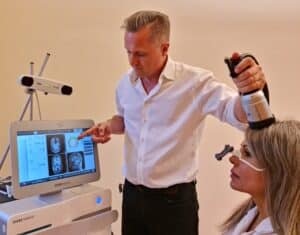Each of us experiences a bad mood from time to time
To be happy, several brain regions have to be activated simultaneously. If only one of these regions drops out, we are near to a depression. The special reatment product of Dr. Seemann is an advancement working on this principle.
After half an hour of a session treatment in the outpatient ambulatory you may feel happier. No matter what caused your mood disturbance, in the brain itself the same scenarios are happening. That is why we start stimulating as early as possible and give hence the possibility to your brain to help itself. Nobody is totally immune against depression. But everybody can fight it.
There is now a new neuro-modulation technique called transcranial pulse stimulation (TPS) which we use OFf-Label. We are the first center to offer this method in depressed patients (with or without dementia), as we experienced surprisingly good effects.

- Efficacy of repetitive transcranial magnetic stimulation in the treatment of depression with comorbid anxiety disorder
- Repetitive transcranial magnetic stimulation in patients with drug-resistant major depression: a six-month clinical follow-up study
- Repetitive transcranial magnetic stimulation (rTMS) modulates time-varying electroencephalography (EEG) network in primary insomnia patients: a TMS-EEG study
- Unilateral and bilateral repetitve transcranial magnetic stimulation for treatment-resistant late-life depression
- Effectiveness of adjunctive repetitive transcranial magnetic stimulation in management of treatment-resistant depression: a retrospective analysis
- Lateralized hippocampal volume increase following high-frequency left prefrontal repetitive transcranial magnetic stimulation in patients with major depression
- The treatment of fatigue by non-invasive brain stimulation
- Transcranial magnetic stimulation for treatment of major depression during pregnancy: a review
- Effectiveness of transcranial magnetic stimulation in clinical practice post-FDA approval in the United States: results observed with the first 100 consecutive cases of depression at an academic medical center
- 5-Hz transcranial magnetic stimulation for comorbid posttraumatic stress disorder and major depression
- Elevated prefrontal GABA in patients with major depressive disorder after TMS treatmend measured with proton magnetic resonance spectroscopy
- Assessing the effects of repetitive transcranial magnetic stimulation on cognition in major depressive disorder using computerized cognitive testing
- Safety and feasibility of repetitive transcranial magnetic stimulation (rTMS) as a treatment for major depression during pregnancy
- Repetitive transcranial magnetic stimulation for treatment of major depression with comorbid generalized anxiety disorder
- Repetitive transcranial magnetic stimulation for Fibromyalgia: systematic review and meta-analysis
- Effectiveness and acceptability of accelerated repetitve transcranial magnetic stimulation (rTMS) for treatment-resistant major depressive disorder: An open label trial
- Repetitive transcranial magnetic stimulation as an augmentiative strategy for treatment-resistant depression, a meta-analysis of randomized, double-blind and sham-controlled study
- The efficacy and safety of low frequency repetitive transcranial magnetic stimulation for treatment resistand depression: the results from a large multicenter french RCT
- Treating anxious depression using repetitive transcranial magnetic stimulation
- Potentiation of quantitative electroencephalograms following prefrontal repetitive transcranial magnetic stimulation in patients with major depression
- The effect of repetitive transcranial magnetic stimulation on fibromyalgia: a randomized sham-controlled trial with 1-mo follow-up
- Long-term follow-up of adolescents with resistant depression treated with repetitive transcranial magnetic stimulation
- Cerebral blood flow in the ventromediall prefrontal cortex correlates with treatment response to low-frequency right prefrontal repetitive magnetic stimulation in the treatment of depression
- Cerebral blood flow ratio of the dorsolateral prefrontal cortex to the ventrolateral prefrontal cortex as a potential predictor of treatment response to transcranial magnetic stimulation in depression
- Efficiacy of adjunctive high frequency repetitive transcranial magnetic stimulation of left prefrontal cortex in depression: a randomized sham controlled study
- Chronic repetitive transcranial magnetic stimulation increases hippocampal neurogenesis in rats
- Efficacy and safety of transcranial magnetic stimulation in the acute treatment of major depression: a multisite randomized controlled trial
- HF-rTMS treatment decreases psychomotor retardation in medication-resistant melancholic depression
- Treatment of vascular depression using repetitive transcranial magnetic stimulation
- Repetitive Transcranial Magnetic Stimulation (rTMS) in the treatment of panic disorder (PD) with comorbid major depression
- Positive predictors for antidepressive response to prefrontal repetitve transcranial magnetic stimulation (rTMS)
- Repetitve transcranial magnetic stimulation treatment of comorbid posttraumatic stress disorder and major depression
- Antidepressant mechanism of add-on repetitive transcranial magnetic stimulation in medication-resistant depression using cerebral glucose metabolism
- Accelerated repetitive transcranial magnetic stimulation for treatment-resistant depression
- Transcranial magnetic stimulation for the treatment of depression: feasibility and results under naturalistic conditions: a retrospective analysis
- The impact of left prefrontal repetitive transcranial magnetic stimulation on depression in Parkinson’s disease: A randomized, double-blind, placebo-controlled study
- Clinical predictors associated with duration of repetitive transcranial magnetic stimulation treatment for remission in bipolar depression: a naturalistic study
- Long-term efficiacy after acute augmentative tepetitive transcranial magnetic stimulation in bipolar depression: a 1-year follow-up study
- Durability of clinical benefit with transcranial magnetic stimulation (TMS) in the treatment of pharmacoresistant major depression: assessment of relapse during a 6-month, multisite, open-label study
